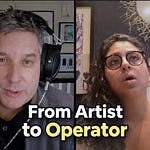This week on Keep Going, I sat down with Miist—an artist whose story is as powerful as her music. She's the first native Chinese artist to break into Billboard’s Top 25 on the AC chart, and she’s worked with legends like Santana and Curtis Williams of Kool & the Gang. But her path to that stage started much earlier, and much harder.
Miist didn’t grow up thinking she’d be a singer. Until late 2023, she hadn’t even released a song. That changed when Narada Michael Walden—producer, drummer, and hitmaker—heard one of her early demos and invited her to meet. What was supposed to be a 30-minute meeting turned into a three-hour jam session and the beginning of her first album.
That debut album yielded “It’s Too Late to Love You,” a duet with Narada that's still on the radio across Europe. But her second album is where she’s aiming straight for the heart—with six songs built around the theme of human connection, each one tied to a 15-second action listeners can take to reconnect with others—and themselves.
Miist doesn’t hide the pain that shaped her. She spoke openly about surviving childhood abuse, the deep loneliness of growing up in a boarding school, and a life-threatening cancer diagnosis that resulted in losing 60% of her liver. That pain didn’t stop her. It gave her a reason to create.
What makes Miist’s work different is that she’s not just singing to entertain. She’s trying to start a movement. One of her recent tracks, “Could You Let Me Smile?”, inspired the launch of a nonprofit called the World Smile Initiative. It began with one tragic story—a young man who died alone and unnoticed—and grew into a global project translating that song into 15 languages. Each version is performed by a local artist in their native tongue. The goal: bring emotion directly to the listener’s heart, no translation needed.
And if you think that sounds too earnest for the music business, well, that’s kind of the point. “If I was with a label, they would never let me do this,” she said. As an indie artist, Miist has the freedom to do what she believes in. No hooks. No formulas. Just a voice, a message, and a belief that change starts small—like with a smile.
She’s also launched a podcast, Make Me Smile with Miist, where each episode focuses on one issue stopping us from forming deeper connections. Each episode ends with a 15-second action anyone can do, right then and there.
When I asked her if she thought suffering was necessary to make art, she paused. “I don’t think we need to,” she said, “but I’m grateful for what I went through. It taught me how to feel. And if I can feel what someone else feels, I can write their story too.”
That’s what Miist is doing—writing stories, connecting people, and reminding us that even the smallest effort can ripple outward.
And yes, she got me to smile. Even if just for 15 seconds.










